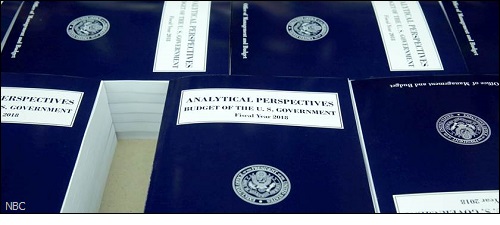
|
|

|
|
| April 25, 2024 |
|
California takes hits in Trump’s 2018 budget proposal 
WASHINGTON--California loses big time in President Donald Trump’s proposed fiscal 2018 budget, made public to scathing political reviews Tuesday.
Some Central Valley farm spending would fall. Nutrition programs would shrink. Certain school grants would be handcuffed, University of California research would be curtailed and reimbursements ended for the state’s incarceration of law-breaking unauthorized immigrants. While slashing social safety nets, Trump wants a 10 percent increase in military spending and $1.6 billion in funding for a wall on the border with Mexico – a small amount for a massive project estimated to cost between $22 billion and nearly $70 billion to construct. House Majority Leader Kevin McCarthy, R-Bakersfield, defended the plans. “The White House has produced a strong, conservative budget,” he said. “While I continue to review the details, it’s obvious that the White House sticks to what is right by prioritizing defense and balancing the budget in 10 years.” Deemed dead on arrival by congressional Democrats, Trump’s $4.1 trillion budget proposal for the new year that starts Oct. 1 disheartened some Republican lawmakers, as well. Everyone agrees it’s only a starting point for negotiations, albeit one with particular consequences for the state that Trump lost by 4.3 million votes last November. “This budget proposal is based on utterly bogus economic assumptions,” said California Gov. Jerry Brown, a Democrat. “It gives a massive tax break to the wealthiest while imposing painful and debilitating burdens on tens of millions of decent and hardworking people. It's unconscionable and un-American.” The budget balancing depends on a sustained 3 percent economic growth rate, which many economists consider unrealistic. Many of Trump’s cuts affecting California, moreover, resurrect previous presidential efforts that evaporated in the face of bipartisan congressional resistance. If anything, the proposed cuts serve mainly as a reminder of the federal government’s vast reach. Like his predecessors, for instance, Trump proposes cutting the State Criminal Alien Assistance Program, which aids state prisons and county jails burdened by the unauthorized immigrant population. The grants can be as small as the $5,063 provided Tuolumne County last year to as large as the $446,997 provided Sacramento County and $552,875 provided Tulare County; for its state prisons, California received $50.6 million. The National Institutes of Health programs that this year will provide more than $210 million for University of California researchers would fall by about 20 percent. The National Endowment for the Arts, whose fall 2016 grant recipients included Fresno’s Radio Bilingue and 161 others in California, would disappear altogether. So would the 43-year-old Legal Services Corp., which supports California Rural Legal Assistance and other legal-aid providers. In an unusual move, citing Trump’s proposal to kill its funding, the Legal Services Corp. filed with Congress its own request for $527.8 million. “Funding for LSC is a rock-solid investment in fundamental American values,” the organization’s president, James J. Sandman, wrote leaders of the House and Senate Appropriations committees, who will have the final say on spending. Some of Trump’s most far-reaching cuts slice into the social safety net. “Throwing billions at defense while abandoning working families will only hollow out our national strength,” said House Minority Leader Nancy Pelosi, a Democrat from San Francisco. Funding for food stamps, now formally known as Supplemental Nutrition Assistance Program, would fall by 25 percent over several years. A work requirement for those without dependents would be also phased in for the program, which currently serves about 4.5 million California residents. This would hit hard in California’s San Joaquin Valley, an area with high unemployment that is predominately represented in Congress by Republicans. “Really, (this) is a taxpayer-first budget,” Office of Management and Budget Director Mick Mulvaney told reporters. Some cuts would save billions of dollars, like the proposed elimination of the $2.9 billion Community Development Block Grant program, which provided $1.8 million to Modesto, $6.3 million to Fresno and $4.4 million to Sacramento last year. Politically, this program and others like it enjoy bipartisan support. “I believe we must balance our duty to reduce spending with the needs of communities throughout the United States,” said Rep. David Valadao, R-Hanford, a member of the House Appropriations Committee. “It’s important to adequately fund the critical programs and services many Americans, like my constituents in California’s Central Valley, rely on every day.” On a relatively smaller scale, Trump proposes eliminating the $82 million-a-year Migrant and Seasonal Farmworker Training grant program, which provided $19 million to California recipients last year. The Trump administration’s budget justification called the farmworker program “duplicative” and added that there is “inadequate competition and very little grantee turnover.” Trump’s budget would also cut the Head Start program by $101 million in California, according to Sen. Kamala Harris, a California Democrat, throwing 11,030 children off early childhood education. “I will stand up, speak out and fight against this budget at every turn,” Harris said. “We are better than this.” (Source: The Sacramento Bee) Story Date: June 3, 2017
|